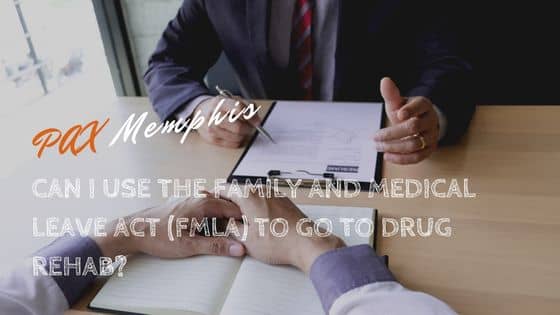Addiction is a serious problem in the United States. According to the National Institutes of Health, 10% of U.S. adults have struggled with an addiction at some point in their lives and 75% of them never received treatment.[1]
While addiction treatment is necessary to recover from a substance use disorder, many people avoid seeking the help they need. Oftentimes, this is because they are afraid they will lose their jobs if they take time off to attend treatment. Thankfully, there are laws and protections in place that can ensure that your job is secure while you are receiving the help you need.
The Family and Medical Leave Act (FMLA) allows you to take unpaid leave to receive necessary medical treatment or to care for a sick family member. This law can prevent you from losing your job while you recover in drug rehab.
What is the Family and Medical Leave Act (FMLA)?
The Family and Medical Leave Act (FMLA) was created to protect individuals from losing their jobs when they need to take medical leave.
According to the U.S. Department of Labor, “The FMLA entitles eligible employees of covered employers to take unpaid, job-protected leave for specified family and medical reasons with continuation of group health insurance coverage under the same terms and conditions as if the employee had not taken leave.”[2] If you meet the eligibility requirements, you can take unpaid leave, keep your insurance, and receive the medical treatment you need.
The FMLA allows you to take unpaid leave for up to 12 weeks for the following reasons:
- The birth of a child
- Caring for an adopted child or foster child within one year of their placement
- Caring for your spouse, parent, or child who has a serious health condition
- Experiencing a serious health condition that renders you unable to perform the essential functions of your job
If you are considering using the FMLA to attend drug rehab, you might be wondering whether addiction counts as a “serious health condition.” Fortunately, the FMLA does recognize substance use disorders as serious health conditions that require treatment.
The FMLA allows you to take unpaid leave for the following conditions:
- Chronic back conditions
- Cancer
- Diabetes
- Emphysema
- Nervous system disorders
- Pregnancy
- Multiple sclerosis
- Pneumonia
- Severe arthritis
- Memory disorders
- Severe depression
- Severe bipolar disorder
- Schizophrenia
- Stress and anxiety
- Post-traumatic stress disorder (PTSD)
- Substance use disorder
It is important to note that this is not an exhaustive list of qualifying conditions. The FMLA will allow you to take leave for any medical or psychiatric condition that affects your ability to function in your daily life and requires inpatient treatment.
Can You Use the Family and Medical Leave Act (FMLA) for Drug Rehab?
Addiction is considered a serious health condition under the FMLA. If you use the FMLA, you can attend rehab for up to 12 weeks without losing your job. However, there are some qualifications you must meet to use this protection for substance abuse treatment.
To use the FMLA to go to drug rehab, you must:
- Experience an illness, injury, impairment, or physical or mental condition that requires inpatient care as a result of your addiction
- Experience a period of incapacity lasting three consecutive calendar days that involves treatment from a medical provider at least once
When using the FMLA, it is important that you actually attend a treatment program. Unless you are actively participating in a drug rehab program, your employer will have the right to terminate your employment. Even further, your employer can fire you if you were abusing substances on the job, as this law only protects your right to receive treatment.
Determining Eligibility for the Family and Medical Leave Act (FMLA)
If you are struggling with drug addiction or alcoholism, receiving professional care from a rehab facility is of the utmost importance. These programs can provide you with all of the support, treatment, and tools you need to maintain long-term recovery. But this can be difficult when you have a career, as taking big chunks of time off is typically frowned upon.
Thankfully, you can receive the help you need while ensuring your job is waiting for you when you get out of treatment. If you meet the following criteria, you are eligible to use the FMLA for drug rehab:
- You work for a covered employer
- You have worked for your employer for 12 months or more (non-consecutively)
- You’ve worked at least 1.250 hours during the 12-month period you worked at the company
- You work in a company where there are 50 employees within a 75-mile radius
If you are confused about what a “covered employer” is, thankfully this term accounts for most employers in the United States. This includes any private sector employer with 50 or more employees working 20 or more weeks each year, schools, and government agencies.
With that being said, most people meet the eligibility requirements for the Family and Medical Leave Act. If you choose to use the FMLA, you must inform your employer before taking leave. (https://teledentistry.com/) In some cases, you might need to show them medical records to prove you require inpatient treatment.
Start Your Recovery Today
If you or a loved one suffers from addiction, professional drug rehab can help you regain control over your life. But, finding a reputable addiction treatment program can be extremely difficult. Thankfully, PAX Memphis can connect you with a highly-rated substance abuse recovery program that meets your every need.
If you need assistance verifying insurance, assessing your rehab needs, and finding the right program for you, contact PAX Memphis today.
References:
Medically Reviewed: September 25, 2019

All of the information on this page has been reviewed and verified by a certified addiction professional.










